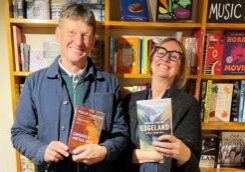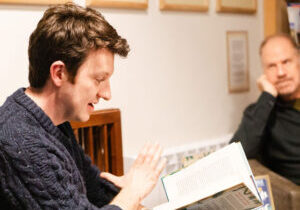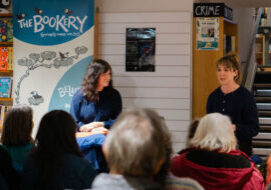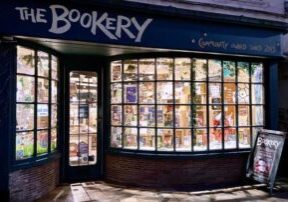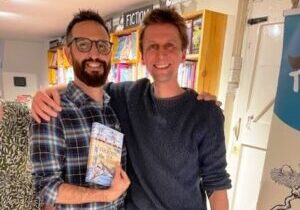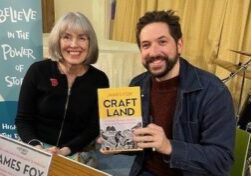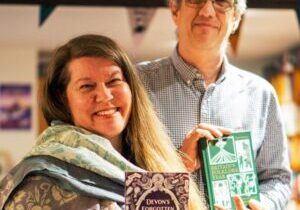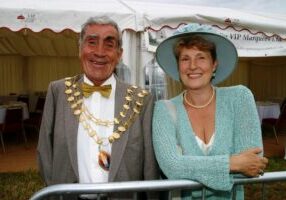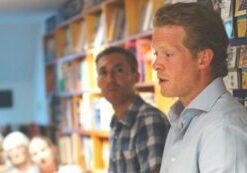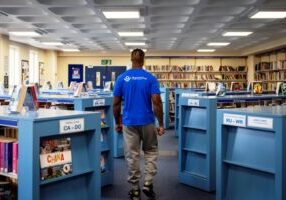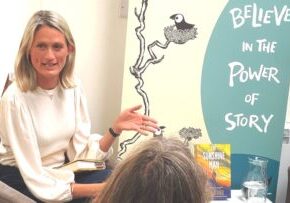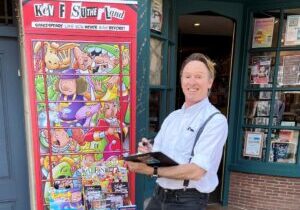FEATURES
Rainforests, Beavers, and Healing on Bodmin Moor
July 7, 2025 | Blog > Features > Rainforests, Beavers, and Healing on Bodmin Moor
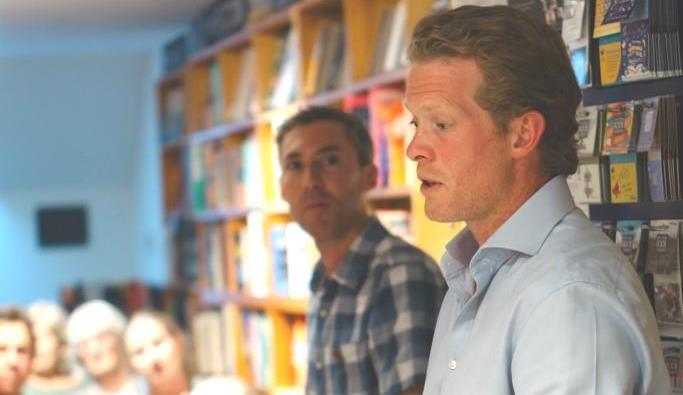
We wrapped up our spring/summer author season at The Bookery with a packed house and an evening that left us all inspired, thoughtful, and just a little bit more in love with the natural world. Our guest was Merlin Hanbury-Tenison, Cornish conservationist, veteran, and author of the powerful memoir Our Oaken Bones. Guiding the conversation with warmth, insight, and a deep understanding of the subject was Nick Bruce-White, CEO of Devon Wildlife Trust.
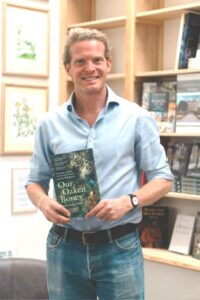 Together, they took us on a journey through grief, recovery, and ecological restoration, all rooted in the ancient and surprising setting of a temperate rainforest in Cornwall. From the very first question—“What’s it like in a rainforest in summer?”—Nick set the tone for a thoughtful and wide-ranging discussion. Merlin’s answer was both poetic and practical: “The two things I can’t control are the weather and the beavers!” That blend of humour and honesty ran through the evening, with Nick expertly drawing out Merlin’s reflections on everything from personal trauma to national conservation policy.
Together, they took us on a journey through grief, recovery, and ecological restoration, all rooted in the ancient and surprising setting of a temperate rainforest in Cornwall. From the very first question—“What’s it like in a rainforest in summer?”—Nick set the tone for a thoughtful and wide-ranging discussion. Merlin’s answer was both poetic and practical: “The two things I can’t control are the weather and the beavers!” That blend of humour and honesty ran through the evening, with Nick expertly drawing out Merlin’s reflections on everything from personal trauma to national conservation policy.
Nick’s questions helped us understand the emotional core of Our Oaken Bones—a book born from pain but filled with hope. He gently led Merlin through stories of PTSD, family illness, and loss, and how the ancient woodland at Cabilla, Merlin’s family farm on Bodmin Moor, became a place of healing for him, his wife Lizzie, and even his father, who spent seven weeks in a coma after contracting Covid.
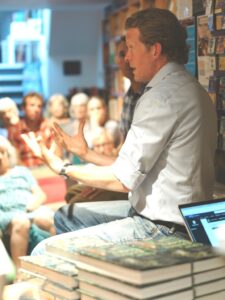 Nick helped the audience grasp the ecological significance of Cabilla, where Merlin and Lizzie discovered that their overgrazed woodland was actually one of the UK’s last remaining fragments of Atlantic temperate rainforest. With research support from the Eden Project, they learned that parts of the forest are over 4,000 years old—a revelation that transformed Merlin’s understanding of stewardship and legacy. Cabilla, once his childhood playground, is now his office and mission. Nick’s thoughtful prompts allowed Merlin to explain how this ancient landscape became the heart of a new vision: one that combines ecological restoration with mental health support, community engagement, and scientific research.
Nick helped the audience grasp the ecological significance of Cabilla, where Merlin and Lizzie discovered that their overgrazed woodland was actually one of the UK’s last remaining fragments of Atlantic temperate rainforest. With research support from the Eden Project, they learned that parts of the forest are over 4,000 years old—a revelation that transformed Merlin’s understanding of stewardship and legacy. Cabilla, once his childhood playground, is now his office and mission. Nick’s thoughtful prompts allowed Merlin to explain how this ancient landscape became the heart of a new vision: one that combines ecological restoration with mental health support, community engagement, and scientific research.
One of the most engaging parts of the evening was the discussion around native species—a topic Nick explored in depth with Merlin. The reintroduction of beavers to Cabilla has been nothing short of transformative. Merlin described the near-instant impact on biodiversity and water management, even if the beavers themselves have proven to be escape artists (six escapes since September 2023!). Nick and Merlin discussed the broader implications of rewilding, including the potential return of pine martens, wildcats, and other native species. Merlin stressed the importance of doing this slowly, carefully, and with full community support. “We live on an island,” he said, “and when native species are removed and non-native ones introduced, the results can be catastrophic.” Nick helped frame this as not just an ecological issue, but a cultural one—about reconnecting with the land and the species that evolved alongside us.
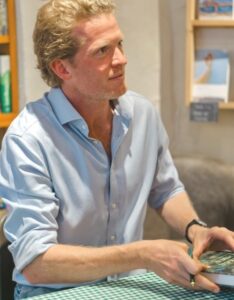 Nick also steered the conversation toward one of the most important and often misunderstood aspects of conservation: the role of farmers. Merlin was clear—without farmers, none of this works. With 70% of the UK’s land used for agriculture, collaboration is essential. Merlin shared that reactions to his work at Cabilla have been mixed: 10% of local farmers love it, 10% fear it, and 70% are just getting on with their lives. But he’s optimistic. “Farmers are incredibly adaptable,” he said, especially in the post-Brexit landscape. Nick echoed this sentiment, highlighting the need for new farming models that deliver both ecological and economic benefits. Together, they painted a picture of a future where conservationists and farmers are not at odds, but working side by side to create a more resilient, biodiverse countryside.
Nick also steered the conversation toward one of the most important and often misunderstood aspects of conservation: the role of farmers. Merlin was clear—without farmers, none of this works. With 70% of the UK’s land used for agriculture, collaboration is essential. Merlin shared that reactions to his work at Cabilla have been mixed: 10% of local farmers love it, 10% fear it, and 70% are just getting on with their lives. But he’s optimistic. “Farmers are incredibly adaptable,” he said, especially in the post-Brexit landscape. Nick echoed this sentiment, highlighting the need for new farming models that deliver both ecological and economic benefits. Together, they painted a picture of a future where conservationists and farmers are not at odds, but working side by side to create a more resilient, biodiverse countryside.
Nick’s sensitive questioning brought out some of the most moving parts of the evening. Merlin spoke about the healing power of nature—not just for himself, but for others. He told the story of “Tyler,” a US military veteran who arrived at Cabilla with chronic back pain and left just days later, pain-free. Cabilla now hosts retreats, including for veterans, and Merlin hopes to expand this work in the future. He also shared his hopes for his next book, which may focus on men’s mental health and the importance of strong role models for young boys—another theme Nick helped explore with care and insight.
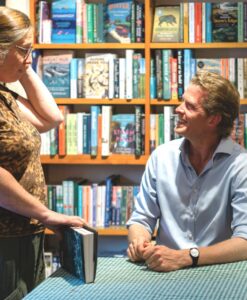 The conversation also turned to education and awareness, especially for children. Merlin is passionate about tackling what he calls “nature blindness”—the fact that many children (and adults) can’t identify common native species. He supports efforts to reduce screen time and increase outdoor learning, and he’s working on initiatives to help schools and parents reconnect young people with the natural world. Nick helped highlight how this ties into the broader mission of the Thousand Year Trust, Merlin’s charity dedicated to restoring Britain’s rainforests, and Merlin’s plan to create the first Atlantic Temperate Rainforest research centre at Cabilla.
The conversation also turned to education and awareness, especially for children. Merlin is passionate about tackling what he calls “nature blindness”—the fact that many children (and adults) can’t identify common native species. He supports efforts to reduce screen time and increase outdoor learning, and he’s working on initiatives to help schools and parents reconnect young people with the natural world. Nick helped highlight how this ties into the broader mission of the Thousand Year Trust, Merlin’s charity dedicated to restoring Britain’s rainforests, and Merlin’s plan to create the first Atlantic Temperate Rainforest research centre at Cabilla.
The evening ended with a lively Q&A, with thoughtful questions from the audience about what defines a rainforest, how to connect more people with nature, and what makes Cabilla such a special safe place. Three lucky attendees received signed drawings from Merlin, and the evening wrapped up with a warm and generous book signing session.
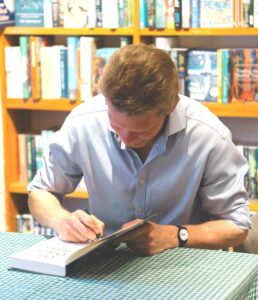 We’re incredibly grateful to Merlin for sharing his story and vision, and to Nick Bruce-White for leading the conversation with such empathy, intelligence, and covering so many important themes. It was a night that reminded us all of our deep connection to the land—and our responsibility to care for it.
We’re incredibly grateful to Merlin for sharing his story and vision, and to Nick Bruce-White for leading the conversation with such empathy, intelligence, and covering so many important themes. It was a night that reminded us all of our deep connection to the land—and our responsibility to care for it.
And yes, in case you’re wondering, we do have signed copies of Our Oaken Bones available in-store and online HERE. Come and grab one while they last!
All Photos by Felicity Billen Photography
July 7, 2025
Blog > Features > Rainforests, Beavers, and Healing on Bodmin Moor

